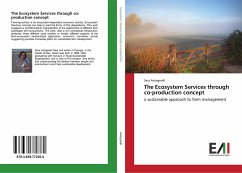Governing the Provision of Ecosystem Services
Herausgegeben:Muradian, Roldan; Rival, Laura
Governing the Provision of Ecosystem Services
Herausgegeben:Muradian, Roldan; Rival, Laura
- Broschiertes Buch
- Merkliste
- Auf die Merkliste
- Bewerten Bewerten
- Teilen
- Produkt teilen
- Produkterinnerung
- Produkterinnerung
Founded on the core notion that we have reached a turning point in the governance, and thus the conservation, of ecosystems and the environment, this edited volume features more than 20 original chapters, each informed by the paradigm shift in the sector over the last decade. Where once the emphasis was on strategies for conservation, enacted through instruments of control such as planning and 'polluter pays' legislation, more recent developments have shown a shift towards incentive-based arrangements aimed at those responsible for providing the environmental services enabled by such…mehr
Andere Kunden interessierten sich auch für
![Wetlands of the Interior Southeastern United States Wetlands of the Interior Southeastern United States]() Wetlands of the Interior Southeastern United States38,99 €
Wetlands of the Interior Southeastern United States38,99 €![The Ecosystem Services through co-production concept The Ecosystem Services through co-production concept]() Sara AntognelliThe Ecosystem Services through co-production concept42,99 €
Sara AntognelliThe Ecosystem Services through co-production concept42,99 €![Servants of the Damned Servants of the Damned]() David EnrichServants of the Damned14,99 €
David EnrichServants of the Damned14,99 €![Records of the Zodiac: as They Appear in the Minute Books, 1868-[1928]; v.1 Records of the Zodiac: as They Appear in the Minute Books, 1868-[1928]; v.1]() New York ZodiacRecords of the Zodiac: as They Appear in the Minute Books, 1868-[1928]; v.140,99 €
New York ZodiacRecords of the Zodiac: as They Appear in the Minute Books, 1868-[1928]; v.140,99 €![Sustainable Finance Fundamentals Sustainable Finance Fundamentals]() Carlos VargasSustainable Finance Fundamentals180,99 €
Carlos VargasSustainable Finance Fundamentals180,99 €![Evaluating Theory-Practice and Urban-Rural Interplay in Planning Evaluating Theory-Practice and Urban-Rural Interplay in Planning]() Evaluating Theory-Practice and Urban-Rural Interplay in Planning75,99 €
Evaluating Theory-Practice and Urban-Rural Interplay in Planning75,99 €![Multiobjective Decision Support for Environmental Management Multiobjective Decision Support for Environmental Management]() R. JanssenMultiobjective Decision Support for Environmental Management39,99 €
R. JanssenMultiobjective Decision Support for Environmental Management39,99 €-
-
-
Founded on the core notion that we have reached a turning point in the governance, and thus the conservation, of ecosystems and the environment, this edited volume features more than 20 original chapters, each informed by the paradigm shift in the sector over the last decade. Where once the emphasis was on strategies for conservation, enacted through instruments of control such as planning and 'polluter pays' legislation, more recent developments have shown a shift towards incentive-based arrangements aimed at those responsible for providing the environmental services enabled by such ecosystems. Encouraging shared responsibility for watershed management, developed in Costa Rica, is a prime example, and the various interests involved in its instauration in Java are one of the subjects examined here.
Produktdetails
- Produktdetails
- Studies in Ecological Economics 4
- Verlag: Springer / Springer Netherlands
- Artikelnr. des Verlages: 978-94-017-8169-5
- 2013
- Seitenzahl: 500
- Erscheinungstermin: 14. Dezember 2014
- Englisch
- Abmessung: 235mm x 155mm x 27mm
- Gewicht: 751g
- ISBN-13: 9789401781695
- ISBN-10: 9401781699
- Artikelnr.: 41907553
- Herstellerkennzeichnung
- Springer-Verlag GmbH
- Tiergartenstr. 17
- 69121 Heidelberg
- ProductSafety@springernature.com
- Studies in Ecological Economics 4
- Verlag: Springer / Springer Netherlands
- Artikelnr. des Verlages: 978-94-017-8169-5
- 2013
- Seitenzahl: 500
- Erscheinungstermin: 14. Dezember 2014
- Englisch
- Abmessung: 235mm x 155mm x 27mm
- Gewicht: 751g
- ISBN-13: 9789401781695
- ISBN-10: 9401781699
- Artikelnr.: 41907553
- Herstellerkennzeichnung
- Springer-Verlag GmbH
- Tiergartenstr. 17
- 69121 Heidelberg
- ProductSafety@springernature.com
1. Introduction: Governing the Provision of Ecosystem Services.- PART I: Keywords and Concepts.- 2. Managing Tropical Forest Ecosystem Services: An Overview of Options.- 3. Partnerships in Global Governance: The Growth of a Procedural Norm Without Substance?.- 4. Ecosystem Services and Payment for Environmental Services: Two Sides of the Same Coin?.- 5. Property Rights and Government Involvement in Market-like Biodiversity Conservation: Empirical Analysis of Bioprospecting.- PART II: The Construction and Evolution of Governance Regimes.- 6. Political Transformation and Watershed Governance in Java: Actors and Interests.- 7. Watershed Development, Decentralization and Institutional Change: Insights from the Mechanism Design Theory.- 8. Sharing the Costs and Benefits of Marine Protected Areas: Implications for Good Coastal Resource Governance.- 9. Indigenous Development Through Payments for Environmental Services in Arnhem Land, Australia: A Critical Analysis.- 10. A Nested Institutional Approach for Managing Bundle Ecosystem Services: Experience from Managing Satoyama Landscapes in Japan.- 11. Institutional and Historical Analysis of Payments for Ecosystem Services in Madagascar.- 12. The Governance of Costa Rica's Programme of Payments for Environmental Services: A Stakeholders' Perspective.- 13. Governance Across Multiple Levels of Agri-Environmental Measures in France.- PART III: The Social Embedding of Pes.- 14. Indigenous Protected Areas in Australia: The Importance of Geophysical and Institutional Scale in Assessing their Effectiveness for Biodiversity Conservation.- 15. Governing Forests for Environmental Provisioning Services: The Example of Honey Production in Southwest Ethiopia.- 16. Investing in Sustainable Use of Biodiversity for Social Benefit in Brazil.- 17. Integrating Agroecology with Payments for Ecosystem Services in Santa Catarina's Atlantic Forest.- 18. Towards an Institutional Approach of Payments for Ecosystem Services: Supply and Demand Perspectives from two Case Studies in the Nicaraguan Agricultural Frontier.- PART IV: The Special Case of Carbon Markets.- 19. A Policy Mix to Finance Protected Areas in Mato Grosso, Brazil.- 20. Forest Carbon Credits Generation in Brazil: The Case of Small Farmers.- 21. Carbon Sequestration Projects in the Peruvian Tropical Forest.- 22. On-Farm Tree Planting in Ghana's High Forest Zone: The Need To Consider Carbon Payments.- 23. Ecosystem Services and Environmental Governance: Some Concluding Remarks.- Index.
1. Introduction: Governing the Provision of Ecosystem Services.- PART I: Keywords and Concepts.- 2. Managing Tropical Forest Ecosystem Services: An Overview of Options.- 3. Partnerships in Global Governance: The Growth of a Procedural Norm Without Substance?.- 4. Ecosystem Services and Payment for Environmental Services: Two Sides of the Same Coin?.- 5. Property Rights and Government Involvement in Market-like Biodiversity Conservation: Empirical Analysis of Bioprospecting.- PART II: The Construction and Evolution of Governance Regimes.- 6. Political Transformation and Watershed Governance in Java: Actors and Interests.- 7. Watershed Development, Decentralization and Institutional Change: Insights from the Mechanism Design Theory.- 8. Sharing the Costs and Benefits of Marine Protected Areas: Implications for Good Coastal Resource Governance.- 9. Indigenous Development Through Payments for Environmental Services in Arnhem Land, Australia: A Critical Analysis.- 10. A Nested Institutional Approach for Managing Bundle Ecosystem Services: Experience from Managing Satoyama Landscapes in Japan.- 11. Institutional and Historical Analysis of Payments for Ecosystem Services in Madagascar.- 12. The Governance of Costa Rica's Programme of Payments for Environmental Services: A Stakeholders' Perspective.- 13. Governance Across Multiple Levels of Agri-Environmental Measures in France.- PART III: The Social Embedding of Pes.- 14. Indigenous Protected Areas in Australia: The Importance of Geophysical and Institutional Scale in Assessing their Effectiveness for Biodiversity Conservation.- 15. Governing Forests for Environmental Provisioning Services: The Example of Honey Production in Southwest Ethiopia.- 16. Investing in Sustainable Use of Biodiversity for Social Benefit in Brazil.- 17. Integrating Agroecology with Payments for Ecosystem Services in Santa Catarina's Atlantic Forest.- 18. Towards an Institutional Approach of Payments for Ecosystem Services: Supply and Demand Perspectives from two Case Studies in the Nicaraguan Agricultural Frontier.- PART IV: The Special Case of Carbon Markets.- 19. A Policy Mix to Finance Protected Areas in Mato Grosso, Brazil.- 20. Forest Carbon Credits Generation in Brazil: The Case of Small Farmers.- 21. Carbon Sequestration Projects in the Peruvian Tropical Forest.- 22. On-Farm Tree Planting in Ghana's High Forest Zone: The Need To Consider Carbon Payments.- 23. Ecosystem Services and Environmental Governance: Some Concluding Remarks.- Index.





![Records of the Zodiac: as They Appear in the Minute Books, 1868-[1928]; v.1 Records of the Zodiac: as They Appear in the Minute Books, 1868-[1928]; v.1](https://bilder.buecher.de/produkte/65/65521/65521810m.jpg)


